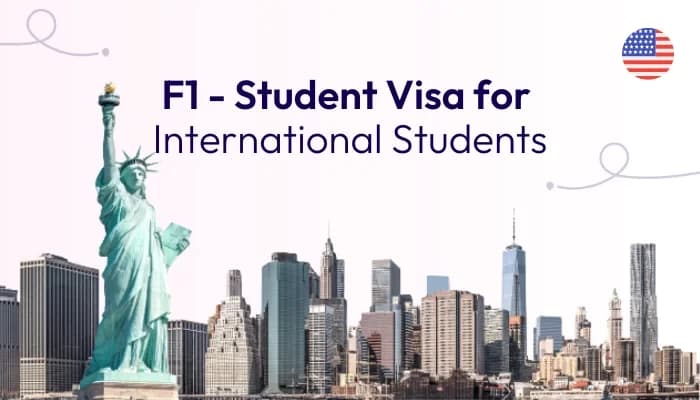F1 Visa Interview: Why are you changing the field of study?

Key Highlights
- Highlight your passion for the new field to show genuine interest and commitment.
- Connect your previous studies or work experience to the new field, showing it as a stepping stone.
- Discuss your long-term career goals and how changing your field aligns with achieving them.
- Provide detailed explanations and examples to make your response compelling.
- Prepare for similar questions that might focus on your decision to change fields and its implications.
Imagine this: You're all set for the big day, documents in hand, dressed to impress, and then comes the question that makes your heart skip a beat. Why are you changing your field of study? It might seem like a simple query, but it's loaded with the potential to make or break your visa application. Fear not! We've got your back. Understanding why this question is asked can help you frame a response that's not just satisfactory but shines a spotlight on your passion, commitment, and the strategic planning behind your decision.
Step-by-Step Guide to Crafting the Perfect Answer
Step 1: Highlight Your Passion
Start with your passion. Visa officers are looking for genuine interest and commitment to your chosen field. Explaining how your interest evolved shows maturity and self-awareness.
Example 1: "I started my undergrad in biology, but after taking a few computer science electives, I discovered my passion for coding and solving complex problems."
Example 2: "While working on my final year project in mechanical engineering, I realized my keen interest in renewable energy, which inspired me to switch to environmental science."
Step 2: Connect the Dots
Explanation: Make it clear how your previous studies or work experience are not a divergence but a stepping stone to your new field. It’s all about the connection.
Example 1: "My background in psychology has equipped me with a unique perspective on user experience, which I plan to apply in my new field of digital design."
Example 2: "My work in healthcare administration exposed me to the technological gaps in patient care, motivating me to pursue a degree in health informatics."
Step 3: Talk About Your Goals
Explanation: Discuss your long-term career goals and how changing your field of study aligns with achieving them. This demonstrates forward-thinking and planning.
Example 1: "Switching to finance from history will not only fuel my passion for economic history but also equip me with the practical skills needed for a career in financial analysis in historical preservation."
Example 2: "By moving into civil engineering from architecture, I aim to directly contribute to sustainable urban development projects worldwide."
Sample Answers
Now, let’s put it all together with three sample answers to guide your own response:
1. From Finance to Environmental Science:
"I've spent years studying finance, but volunteering with an environmental NGO made me realize my passion lies in sustainable development. My background in finance isn't divergent; instead, it equips me with a unique perspective on environmental economics and funding for conservation projects. I aim to bridge the gap between economic practices and environmental sustainability, contributing to more viable conservation strategies globally."
Reasoning: This answer is compelling because it demonstrates the applicant's evolution from a finance background to a passion for environmental science through hands-on experience. The respondent skillfully bridges their past and future, emphasizing how their unique blend of skills will contribute to innovative solutions in sustainable development.
2. From Literature to Computer Science:
"My love for storytelling hasn’t changed, but I’ve become fascinated by how technology can transform narratives and reach. Learning to code in my free time showed me the potential of digital platforms in literature, and I see computer science as a tool to innovate in storytelling. My goal is to develop interactive, narrative-driven applications, merging my literary foundation with new tech skills."
Reasoning: This answer excels by weaving together the applicant's enduring love for literature with their newfound interest in computer science. It presents a creative and forward-thinking perspective on how technology can enhance storytelling, suggesting a unique interdisciplinary approach. The mention of self-learning coding skills indicates initiative and a proactive attitude towards personal and professional development
3. From Biology to Public Health:
"While studying biology, I became particularly interested in the societal impacts of diseases and the importance of public health initiatives. My scientific background provides a strong basis for understanding public health challenges, and changing my field of study reflects my desire to apply this knowledge more directly to improve healthcare outcomes. I envision working on global health policies, where I can use both my scientific understanding and my public health training."
Reasoning: This response is effective because it clearly connects the applicant's background in biology to their aspiring career in public health, underlining a natural progression of interest towards the societal impacts of scientific knowledge. It portrays a thoughtful consideration of how their scientific expertise can be applied to address broader health challenges.
Navigating Similar Questions with Confidence
Alright, now that we've tackled how to answer the big question about changing your field of study, let’s not stop there. The F1 visa interview can throw a few curveballs that might seem different but actually require a similar strategy in answering. Knowing these questions ahead of time can help you prepare more effectively and respond with confidence.
-
What prompted you to pursue a degree in [new field] instead of continuing with [previous field]?
This question is a close cousin of the one we've extensively covered. It's digging for the reasons behind your transition, focusing on what exactly drew you to the new field.
-
How do you think your previous studies or work experience will benefit you in your new field of study?
Here, the focus shifts slightly to understanding how your past experiences contribute to your future studies. It’s another way of asking you to connect the dots between your past and future.
-
Can you explain how your career goals have evolved leading to this change in your field of study?
This question zeroes in on your career trajectory and how your aspirations have changed over time, prompting a switch in your field of study.
Wrapping It Up: Keep It Real, Keep It You
Remember, folks, the F1 visa interview is your stage to shine. When you're asked about changing your field of study, it's not just about the 'what' but the 'why' and 'how.' It's your story, your passion, and your vision for the future. Be honest, be enthusiastic, and most importantly, be yourself. Use these tips and examples as your guide, but let your unique journey and goals color your answers. After all, it's your adventure that's just waiting to unfold. So, gear up, practice your heart out, and go ace that interview!
Have Questions About This Topic?
Join our community to get personalized advice and share experiences with others going through similar visa processes.





